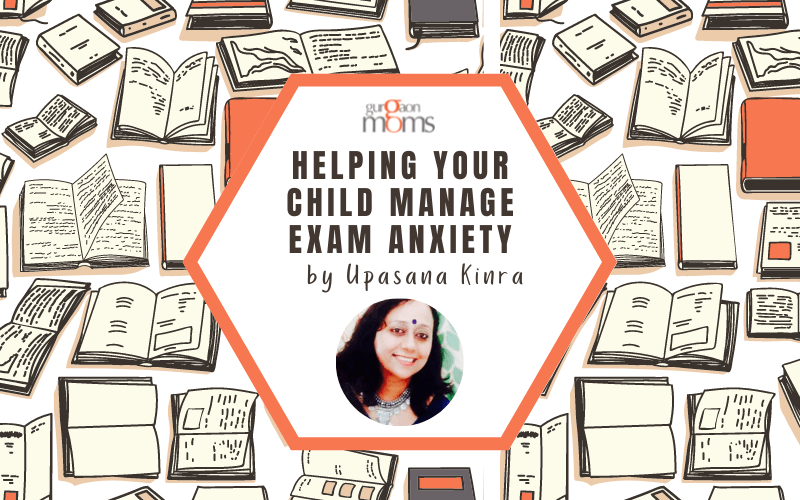Are you doing it right?
“This is not the time to rest.”,
“See how your friend studies the entire day.” ,
“If you don’t score well, then you won’t get admission to a good college.”,
“If you don’t do well in your exams, how will you succeed?”,
“I will not talk to you if you don’t get above 90% this time”,
“When we were your age, we were so sincere and studied the whole day.”
Do you hear yourself in any of these statements?
You add to your child’s exam anxiety if you say one of these. But the good news is that parents can also help their children manage exam anxiety. To help them cope with exam anxiety, you must first understand its underlying causes.
Parent’s Guide to Exam Anxiety
Exam anxiety is the uneasiness or apprehension a student feels before, during, or after an exam because of worry or fear of failure. Everyone experiences anxiety from time to time; low anxiety levels can motivate students to study and perform well. However, when anxiety interferes with test-taking and learning, it can cause students to —”blank out “or have trouble paying attention, limiting their ability to think clearly and do their best work.
Here are some key signs to look out for which suggest that your child may be experiencing exam anxiety:
Physiological symptoms of exam anxiety:
- Palpitations (rapid heartbeat)
- Rapid breathing
- Excessive sweating
- Dry mouth
- Lightheadedness
- Cold or clammy hands
- Feeling faint
- Headache
- Nausea
- Sleeplessness
- Oversleeping
- Overeating
- Lack of appetite
Cognitive symptoms of exam anxiety:
- Negative thoughts
- Self-doubt
- Difficulty concentrating
- Difficulty memorizing
- Unfavourable comparison with other students
- Racing thoughts
Emotional symptoms of exam anxiety:
- Low self-worth
- Angry outbursts
- Tearfulness
- Hopelessness
- Loss of interest in other activities
Different ways a Parent Can Help their Child Deal Effectively with Exam Anxiety
“Children need a positive environment, and parents need to enable a positive environment!”
PARENT TIP # 1
Let’s Normalize Stress
It is normal to feel stress during exam time. A little pressure can be a motivational push, that your child might need to perform well. Talking to your child and finding out about the cause of worry can be an excellent way to start. We can let them know that everyone gets nervous before exams and that it is OK to feel this way.
PARENT TIP # 2
Use Positive Language
We all know that exams are essential and imperative in building one’s self-image and career path. However, sharing this wisdom around exam time is not helpful, but this would instead add to their stress. It is advisable to create a positive environment by focusing on your child’s strengths more than their weaknesses.
For example- They may be good in languages rather than Mathematics. If you build their confidence related to one subject, that confidence may also transfer to the other subject, to some extent.
PARENT TIP # 3
Manage Your Anxieties
While you may be worried about your child’s exam stress and anxiety, it is essential to keep it in perspective. Take a pause! Reflect!
Is it your anxiety around the time when you were a child and didn’t perform that well? Or is it your anxiety that your child may not be as successful as you are? Or are you too anxious about your image in your peer group, which is connected with your child’s performance?
It will be helpful to reflect on these questions and understand your core beliefs about exams. You can deal with unnecessary exam anxiety by separating your stress from your child’s. It is OK to worry, but it is not OK to put too much pressure on yourself or your child.
PARENT TIP # 4
Allow Them to Have Downtime
As a parent, we might find it tempting to take away all the gadgets and impose a curfew on our children so they can concentrate better. Think again!
Exams are also the time when children need a break and to rejuvenate. They need someone to talk to, whom they find non-judgmental. A small chat with a friend or a game of football in the nearby playground will help them reduce their stress and relax. Friends form an essential part of their support structure which should stay the same during the exams.
PARENT TIP # 5
Some Essential Study Habits to Incorporate into your Child’s Schedule
a) Each child has a different approach to learning. Let them follow that as long as it yields good results and doesn’t affect their health.
b) Include practice exams in your child’s routine and time them.
c) Study time can be more fun with new stationery, highlighters, and innovative and fun techniques to learn and memorize things.
Let’s see how you can plan and organize effectively for exams:
a) You will be better at planning things for them, so help them plan a routine to effectively balance study and relaxing time.
b) It is not just your kid who has to be on schedule—a vital exam ropes in everyone in the family. Keep noise and distractions at bay. Keeping regular sleep patterns is essential during this period.
c) Break study time into small chunks with short breaks for better learning & retention.
d) Create notes or postcards which are helpful during revision.
PARENT TIP # 6
Promote a Healthy Lifestyle
While stress-busting strategies can be helpful, there’s no ‘quick fix’ for coping with feelings of anxiety. A healthy lifestyle is the biggest key to managing exam stress. Good sleep hygiene, a balanced online life, exercise, and a healthy diet are the best ways to produce endorphins, a chemical that reduces stress and anxiety. A healthy lifestyle will help them to build resilience, and they’ll be more likely to cope with heightened tension. Supporting the young person to continue with sports and hobbies and discouraging them from late-night revision sessions will help them to maintain good health. Promoting hard work without worrying too much about the outcomes or results is recommended.
PARENT TIP # 7
Provide Emotional Support
Your children need your emotional support during their exam time. They need to know that you love them and accept them unconditionally. Helping your child stay positive is part of your job and the primary job right now for which you need to stay positive too. Observing your child is very important. Look out for signs of anxiety and stress and rectify them before it takes a toll on them. Talk to them!
PARENT TIP # 8
Educate Them About Mental Health
Psychoeducation on stress and exam anxiety can be helpful for your children to deal effectively with it. It will help them recognize exam anxiety’s signs and symptoms, learn more about some stress-busting strategies and reach out for help at the right time.
PARENT TIP # 9
Take Professional Help
If your child’s anxiety is becoming too much for you or them to handle, you must get support. An excellent place to start is by getting help from the school counsellor or asking the school counsellor if they can recommend any resources. Alternatively, you can also try meeting a professional outside school who can help ease the stress.
On a Parting Note:
Do not burden your child with huge expectations. Instead, ask them to give their best shot and never give up. Motivate them to leave nothing unfinished, no matter how hard it is. In the name of motivation, bribing the child with something they always wanted is not a good idea. Instead, ask them to stop worrying and enjoy studying. Be there to help. Share your experiences. Help them celebrate their achievements. Encourage them to do well for themselves and not to please anyone.
You’ll be surprised by the results!
Beat their stress with these simple tips and stay positive.
Help your Child Grow!
 This article is by Upasana Kinra
This article is by Upasana Kinra
Upasana Kinra, a Psychologist and an educator is presently working as Head, Behavioural and Career Counselling (International education) and A-Level Psychology teacher at DPS International, Saket, New Delhi. She is currently pursuing a Ph.D. in Counselling Psychology from O.P. Jindal University. Save & ExitShe is a nature lover, ‘diy’ enthusiast who also enjoys reading, painting, dancing and travelling. Her underlying belief is in the dignity and worth of all people.






